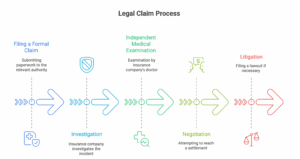Life throws curveballs, and sometimes those curveballs leave more than just a bruise. Psychological injuries, though invisible, can be deeply debilitating. If you believe you’ve suffered one due to someone else’s actions or negligence, filing a claim can feel overwhelming. This guide breaks down the process, offering a clear path forward.
Understanding Psychological Injury: What Constitutes a Valid Claim
A psychological injury is damage to your mental or emotional well-being. Unlike a physical injury, it’s harder to see, but the impact can be just as severe. Common examples include:
- Anxiety disorders: Constant worry and fear impacting daily life.
- Depression: Persistent sadness, loss of interest, and hopelessness.
- Post-traumatic stress disorder (PTSD): Triggered by a traumatic event, causing flashbacks, nightmares, and severe anxiety.
- Adjustment disorder: Difficulty coping with a stressful life event, leading to emotional or behavioral symptoms.
For a psychological injury to be a valid claim, it usually needs to be the result of a specific event or series of events, not just general life stress. Think of a bank teller developing PTSD after a violent robbery, or an employee developing anxiety and depression due to relentless workplace bullying. Recent data shows that workplace bullying is a significant contributor, with studies estimating that nearly 20% of US employees have experienced it, potentially leading to significant mental health issues.
Establishing a Link: Causation and Your Psychological Injury
The key to a successful claim is proving causation – showing a direct link between the incident and your psychological injury. You must demonstrate that the incident caused your condition.
For instance, imagine a construction worker witnessing a gruesome accident on site. They later develop PTSD. To build their case, they’d need to show that the accident, and not pre-existing anxiety or other life stressors, is the primary cause of their PTSD.
This is where expert testimony from mental health professionals becomes crucial. They can assess your condition and offer an opinion on whether the incident was a significant contributing factor.
Gathering Evidence to Support Your Psychological Injury Claim
Solid evidence strengthens your claim. Key pieces include:
- Medical records: Documenting diagnoses, treatment plans, therapy sessions, and medication.
- Witness statements: Accounts from individuals who witnessed the incident or observed your mental and emotional state afterward.
- Incident reports: Official records of the event that caused the injury (e.g., police reports, workplace accident reports).
- Personal journal or diary: Detailing your symptoms, feelings, and the impact of the injury on your daily life.
- Expert opinions: Reports from psychologists or psychiatrists linking your condition to the incident.
Navigating the Legal Process of Filing a Claim
The process varies depending on the type of claim (e.g., workers’ compensation, personal injury). Generally, it involves:
- Filing a formal claim: Submitting paperwork to the relevant insurance company or court.
- Investigation: The insurance company investigates the incident and your claim.
- Independent Medical Examination (IME): The insurance company may require you to be examined by their doctor (often a psychiatrist or psychologist). This is to assess your condition and provide an independent opinion. Treat this examination like a deposition; answer truthfully and don’t exaggerate, but don’t downplay your symptoms either.
- Negotiation: Attempting to reach a settlement with the insurance company.
- Litigation (if necessary): Filing a lawsuit if a settlement cannot be reached.

Calculating Damages in a Psychological Injury Case
“Damages” refers to the compensation you seek. This can include:
- Medical expenses: Costs of therapy, medication, and other treatment.
- Lost wages: Income lost due to your inability to work.
- Pain and suffering: Compensation for the emotional distress, anxiety, and impact on your quality of life.
- Loss of enjoyment of life: Compensation for activities you can no longer participate in due to your injury.
Settlements vary greatly depending on the severity of the injury, the impact on your life, and the strength of your evidence. Some cases settle for tens of thousands of dollars, while others involving severe PTSD or long-term disability can reach significantly higher amounts. For instance, a case involving ongoing, intensive therapy and inability to return to work could result in a larger settlement than one where the individual recovers relatively quickly.
Common Challenges and How to Overcome Them When Filing a Psychological Injury Claim
One common challenge is skepticism. Psychological injuries are often viewed with suspicion, making it harder to prove their existence and severity. Be prepared to provide detailed evidence and seek support from medical professionals.
Another challenge is the insurance company’s tactics, such as denying claims or offering low settlements. Don’t be afraid to push back and negotiate, and consider consulting with an attorney.
Seeking Professional Help: Lawyers and Therapists for Your Claim
A lawyer specializing in personal injury or workers’ compensation claims can guide you through the legal process, negotiate with insurance companies, and represent you in court. They understand the complexities of these cases and can significantly increase your chances of success.
Just as importantly, seeking therapy is crucial for your recovery. A therapist can provide you with the tools and support you need to cope with your psychological injury and improve your mental well-being. Remember, your health comes first.



